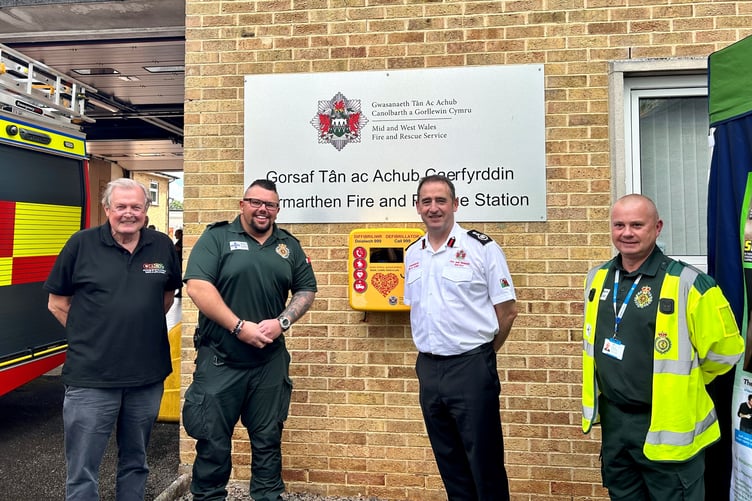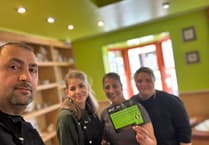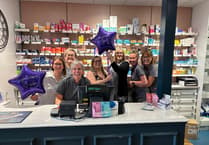Mid and West Wales Fire and Rescue Service (MAWWFRS) is working in partnership with Save a Life Cymru (SALC) and Welsh Ambulance Service Trust (WAST) to increase the number of lifesaving public access defibrillators.
SALC was established in 2019 by Welsh Government and is working to ensure everyone’s chance of surviving an out of hospital cardiac arrest is the same across Wales, to increase the number of people willing to attempt cardiopulmonary resuscitation (CPR) and to increase the public’s understanding of defibrillators and what to do if a cardiac arrest occurs.
A sudden cardiac arrest can happen to anyone, at any age, and every year in Wales, over 6,000 people suffer an out of hospital cardiac arrest. The chance of surviving one will fall by 10% with every passing minute if someone doesn’t attempt CPR or using a defibrillator, currently only around 30-40% of people who suffer a cardiac arrest in the community will receive bystander CPR.

By working in partnership, MAWWFRS and SALC have identified 22 Fire Stations that do not have a public access defibrillator (PAD) within 500 metres and are working to correct this. During MAWWFRS’s Headquarters Open Day on Friday, September 1st, the PAD rollout programme was officially launched, with the first unit being unveiled at Carmarthen Fire Station.
The launch, which was attended by MAWWFRS operational and support staff, as well as Open Day visitors, saw Chief Fire Officer Roger Thomas welcome SALC Chair, Professor Len Nokes, SALC Community Co-ordinator Marc Gower and Nick Ozzati from WAST.
During the unveiling, CFO Thomas said:
“It’s a pleasure to be launching this new rollout of lifesaving PAD units at our Fire Stations. MAWWFRS Fire Stations are known as community landmarks and are strategically located throughout the communities we serve to maximise fire cover and protection to the public. Having 24-hour access to PADs at these selected Fire Stations will greatly improve patient outcomes in the event of a cardiac arrest.
I know that some of our crew members have first-hand experience of using a PAD and how effective they can be, with firefighters from Pontarddulais Fire Station recently using a defibrillator on a casualty.”
SALC Chair, Professor Len Nokes said:
“I am delighted that Save a Life Cymru has set up a new partnership with Mid and West Wales Fire and Rescue Service to ensure that communities within the Service’s area will have improved 24/7 access to lifesaving defibrillators.
I must thank Nick Ozzati who initially identified the stations that would benefit from a free Welsh Government community PAD.
“This is also an excellent opportunity for me to introduce Marc Gower, Save a Life Cymru’s new Community Co-ordinator, to the region. As with this partnership, Marc’s role is to work with organisations and communities across the region to coordinate and manage Public Access Defibrillator installations. He is also responsible for supporting the PAD registration process on The Circuit - the national defibrillator network - to ensure that defibrillators are known and available to the 999 emergency call takers, to help those who suffer a cardiac arrest.”
The rollout of PAD units at MAWWFRS Fire Stations will continue over the coming months. Defibrillators are simple and safe to use, with no training required to operate one. Once activated, it will tell you exactly what to do and when and how to deliver a safe shock. When you dial 999, the call taker will instruct you on where the nearest registered defibrillator is located and a code to open the cabinet if required.
A cardiac arrest is when a person’s heart stops pumping blood around their body and they stop breathing normally, whereas a heart attack is when one of the coronary arteries becomes blocked, the heart muscle is then robbed of its vital bloody supply and if left untreated, it will begin to die due to lack of oxygen. Learn more on the differences between a heart attack and a cardiac arrest on the British Heart Foundation’s website.
A heart attack and a cardiac arrest are both emergency situations – always call 999 straight away.
MAWWFRS is pleased to be developing its partnerships with SALC and WAST to improve access to PAD units across its Service area and to increase the public’s understanding of defibrillators and their importance. Increasing the number of 24-hour access defibrillators at MAWWFRS Fire Stations will improve the Service’s community safety provision and patient outcomes in the event of a cardiac arrest.





Comments
This article has no comments yet. Be the first to leave a comment.